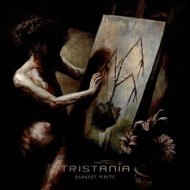 Tristania are one of my favourite bands. For me, there’s no-one ahead of them in the field of darkwave gothic metal music. I go back to “World of Glass” (2001), a work of metal and magic, then bought “Ashes” (2005) and found yet more magic in the band’s last release “Rubicon” (2010). By this stage Kjetil had joined from the equally charismatic Green Carnation and introduced a new level of vocals and ambiance. So we not only had melodies, we had gothic melancholy, fizzing atmospheres, a delightful combination of male and female vocals and everyday themes which are both recognisable and unsettling at the same time. So it was with great excitement that I picked up “Darkest White”, an appropriate title for a Tristania album, based on past productions.
Tristania are one of my favourite bands. For me, there’s no-one ahead of them in the field of darkwave gothic metal music. I go back to “World of Glass” (2001), a work of metal and magic, then bought “Ashes” (2005) and found yet more magic in the band’s last release “Rubicon” (2010). By this stage Kjetil had joined from the equally charismatic Green Carnation and introduced a new level of vocals and ambiance. So we not only had melodies, we had gothic melancholy, fizzing atmospheres, a delightful combination of male and female vocals and everyday themes which are both recognisable and unsettling at the same time. So it was with great excitement that I picked up “Darkest White”, an appropriate title for a Tristania album, based on past productions.
There are changes. This is normal of course. We have to wait a while for the imaginative songs, because Tristania start by setting out to crush us with dark and fiery metal. I can’t say that I warmed to the heavier side of this album, not that it’s bad. The first two tracks are heavy. Dark clouds form and “Number” sounds like a black metal track. The lady singer Marieangela (Mary) starts up and in her bid to outing the heaviness around her sounds as if she’s belting out the Stars and stripes. The orchestral section adds pathos. After a break it continues in the earlier lofty black metal combination. It’s powerful to a point but I’m not convinced. The title track which follows has a certain groove. Heavy again and replete with growls, the vocals should add drama but the one-for-all, all-for-one chorus was a bit cheesy. The final track of the album “Arteries” disappointed me too. It’s a dark song comprising growled gothic metal and a pop chorus. The two didn’t go together. In fact it’s almost too simplistic for Tristania and there’s nothing special to give it real distinction.
Then there are the seven tracks in the middle. After my initial disappointment, there’s a mood change from “Himmelfall”. It steps up the ante. It has gothic depth, a bit like Tiamat, and there subtle guitar strains in the background. The drums add menace and intent. We’re moving and grooving now. I love that guitar line. Mary’s entrance is timely and superimposes authority and majesty. The guitar work is chunky. Deep orchestral sounds enter the fray. This is an exciting and well-balanced song. “Requiem” then follows. It is a largely upbeat song with sinister undertones. Mary sings with feeling. What makes this track special, rather than the song itself, which actually is rather pedestrian, are the instrumental subtleties in the background. The track transforms into cloudy darkness and heavy growls. Arising from the ashes are the female vocals as the track then picks up its principal pattern again. Mary’s prolonged notes on “Diagnosis” bring thoughts of The Gathering. The drumming, which is distinctive throughout, is now urgent. Those drums then create a dark and ferocious atmosphere with their constancy. Not for the first time Kjetil aspires to the theatrical with his vocals. Mary adds weight. As it gets darker, the intensity of “Scarling” increases. There’s a kind of avant-garde feel here in the way that the mood shifts. The atmosphere is impressive as there’s a sense of being weighed down. The chorus is good but not really majestic. The track ends powerfully. This album cannot be accused of staying still as hypnotic rhythms and sublime female vocals infect “Night on Earth”. In spite of the sweeping sounds and the rock and roll style I found this track a bit dull. Male and female vocals combine with a pensive instrumental section on “Lavender”. Mary’s beautiful voice gives the sweet smell, but the tension heightens impressively at the same time, bringing on a mood of sadness. The chorus however is weak and with it went the impact. To this point, “Himmelfall” had been the highlight, combining all the elements that make Tristania special, but now comes “Cypher”. This has the presence of the memorable “Sirens” on the “Rubicon” album. There is a hypnotic beat which stays with it. Kjetil enunciates his words clear and ominously. The bass rumbles. The guitar rhythm heightens the atmosphere. There’s a sense of heightening build-up. The guitar cuts in. This time it’s more pungent. The drums are always in the lead. The guitar work is now delicate. After a break, powerful instrumentals take over. “Cypher” is a multi-coloured and memorable track.
I didn’t get the flow or atmospheres as readily as I have with previous Tristania albums. In some respects, particularly on the heavier tracks, “Darkest White” drops back into the pack of ordinary gothic metal, but this is compensated for elsewhere by some wonderfully kaleidoscopic and epic soundscapes. Although I didn’t find this album as captivating as “Rubicon” in particular, it still has many magical moments in there.
(7/10 Andrew Doherty)

Leave a Reply